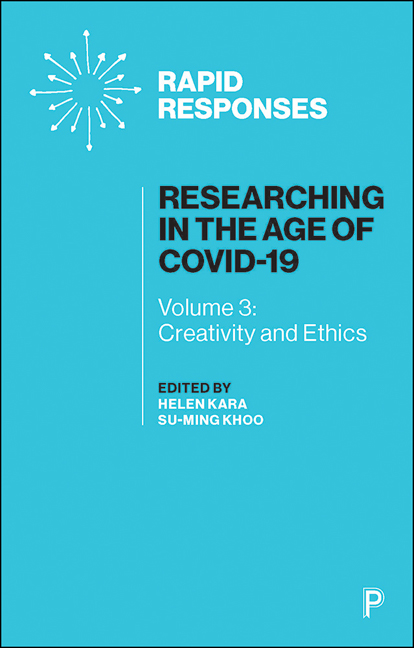4 - Pandemic Tales: Using Story Completion to Explore Sense-Making Around COVID-19 Lockdown Restrictions
Published online by Cambridge University Press: 23 March 2021
Summary
Let's start our tale about researching in a pandemic with the beginning of a story:
Sam has been keeping in touch with friends online during the COVID-19 Lockdown, and learned that some of them are going to meet up in the big local park, just after dark, to hang out and have a drink… They’re encouraging Sam to come along…
We invite you to imagine how you might tell the rest of this story, or indeed to go ahead and write it. We ask you to then reflect on what emotions this scenario evokes for you. The research we describe in this chapter stemmed from emotional responses – personally felt, and witnessed – to a global crisis, and specifically to an unprecedented ‘lockdown’ of normal life. In response to the COVID-19 pandemic, the UK and Āotearoa/New Zealand (NZ) went into full lockdown at the same time (24 and 25 March 2020, respectively). The research we describe took root in several emotion-filled (virtual) conversations related to media coverage of high-profile public figures breaching the COVID-19 pandemic lockdown rules. We also witnessed and discussed friends and strangers online justifying why it would be okay for them to bend or break lockdown rules, alongside people urging others not to rush to judgement. Our emotional responses reflected many experiences and positions. We were personally significantly impacted: one of us was shielding (isolated at home) due to health risk; one was ordered home from overseas by their employer, disrupting several months of planned work and travel; and one has three teenage children whose lives have been upended by the sudden closure of schools/universities, with huge impact on their wellbeing. We are also natural rule followers – when we see those rules as working for collective good. Further, as critics of neoliberalism, we saw this rule bending or breaking as evidence of the privileging individual entitlements over collective interests.
What we were witnessing on the news and in online social spaces not only frustrated and angered us, it piqued our curiosity as psychologists. As a group, we have training in social psychology, where rule breaking and conformity are core concerns, and interests in health and wellbeing. That piqued curiosity led us to explore how NZ and UK residents made sense of rule breaking and compliance in relation to the COVID-19 pandemic lockdown.
- Type
- Chapter
- Information
- Researching in the Age of COVID-19Volume III: Creativity and Ethics, pp. 39 - 48Publisher: Bristol University PressPrint publication year: 2020
- 2
- Cited by

